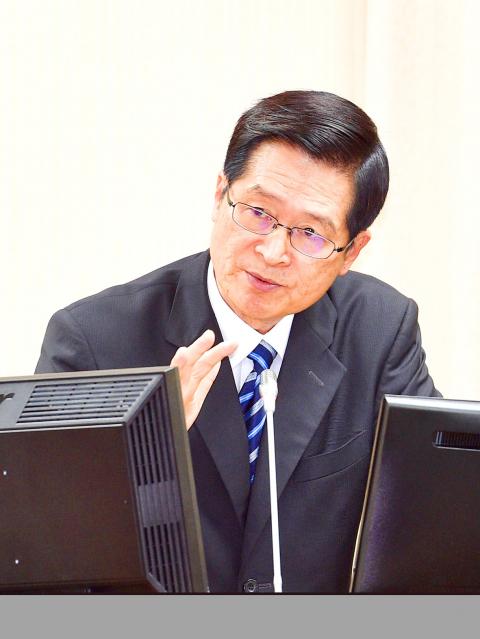National defense expenditure is to increase substantially next year, with research and development accounting for more than 3 percent of overall defense spending, which is expected to lead to a major increase in the Chungshan Institute of Science and Technology’s business operations.
Minister of National Defense Yen De-fa (嚴德發), who also serves as the institute’s president, last month said that it could see its business next year exceed NT$50 billion (US$1.63 billion), a source familiar with the institute quoted Yen as saying.
Yen made the remark on Nov. 9 at an event to mark the institute’s 49th anniversary, the source said on condition of anonymity.

Photo: Peter Lo, Taipei Times
National defense expenditure is to increase by NT$18.3 billion next year, including NT$13.9 billion for research and development, which would be more than 3 percent of overall defense spending, marking the attainment of a major policy milestone, Yen was quoted as saying.
The institute’s scale of business has also grown significantly, from about NT$18 billion in 2014 to about NT$40 billion this year, the source said.
National defense spending is entering a peak period, with new indigenous military jet and warship programs set to begin next year, the source said.
As many of the armed forces’ weapons systems and equipment near the end of their life cycle or run out of suppliers for spare parts, developing a self-reliant national defense industry is particularly important, the source quoted Yen as saying.
The institute’s efforts are part of a government-wide effort to encourage innovation across industries and form links necessary for the nation to prosper, the source said.
The institute also provides a platform to cultivate technological expertise, the source said, adding that it hired 638 people this year, including 38 with doctorates and 272 with master’s degrees, with graduates of public colleges and universities accounting for 79.5 percent of new employees in the past three years.
As Beijing continues to modernize the Chinese People’s Liberation Army, budget increases are a crucial step toward enhancing the nation’s military strength and its ability to deter adversaries, the source said.

The combined effect of the monsoon, the outer rim of Typhoon Fengshen and a low-pressure system is expected to bring significant rainfall this week to various parts of the nation, the Central Weather Administration (CWA) said. The heaviest rain is expected to occur today and tomorrow, with torrential rain expected in Keelung’s north coast, Yilan and the mountainous regions of Taipei and New Taipei City, the CWA said. Rivers could rise rapidly, and residents should stay away from riverbanks and avoid going to the mountains or engaging in water activities, it said. Scattered showers are expected today in central and

COOPERATION: Taiwan is aligning closely with US strategic objectives on various matters, including China’s rare earths restrictions, the Ministry of Foreign Affairs said Taiwan could deal with China’s tightened export controls on rare earth metals by turning to “urban mining,” a researcher said yesterday. Rare earth metals, which are used in semiconductors and other electronic components, could be recovered from industrial or electronic waste to reduce reliance on imports, National Cheng Kung University Department of Resources Engineering professor Lee Cheng-han (李政翰) said. Despite their name, rare earth elements are not actually rare — their abundance in the Earth’s crust is relatively high, but they are dispersed, making extraction and refining energy-intensive and environmentally damaging, he said, adding that many countries have opted to

SUPPLY CHAIN: Taiwan’s advantages in the drone industry include rapid production capacity that is independent of Chinese-made parts, the economic ministry said The Executive Yuan yesterday approved plans to invest NT$44.2 billion (US$1.44 billion) into domestic production of uncrewed aerial vehicles over the next six years, bringing Taiwan’s output value to more than NT$40 billion by 2030 and making the nation Asia’s democratic hub for the drone supply chain. The proposed budget has NT$33.8 billion in new allocations and NT$10.43 billion in existing funds, the Ministry of Economic Affairs said. Under the new development program, the public sector would purchase nearly 100,000 drones, of which 50,898 would be for civil and government use, while 48,750 would be for national defense, it said. The Ministry of

UNITED: The other candidates congratulated Cheng on her win, saying they hoped the new chair could bring the party to victory in the elections next year and in 2028 Former Chinese Nationalist Party (KMT) lawmaker Cheng Li-wun (鄭麗文) yesterday won the party’s chair election with 65,122 votes, or 50.15 percent of the votes. It was the first time Cheng, 55, ran for the top KMT post, and she is the second woman to hold the post of chair, following Hung Hsiu-chu (洪秀柱), who served from 2016 to 2017. Cheng is to succeed incumbent Eric Chu (朱立倫) on Nov. 1 for a four-year term. Cheng said she has spoken with the other five candidates and pledged to maintain party unity, adding that the party would aim to win the elections next year and